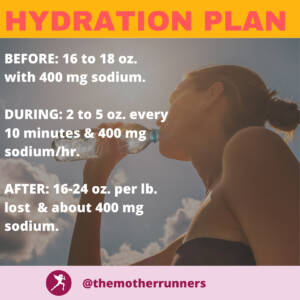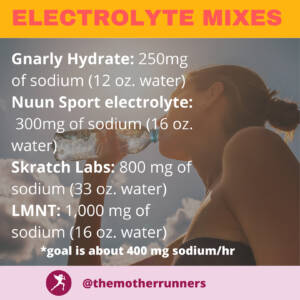Hydration for runners running long distances is so important for proper biological functioning. Registered sports dietitian Megan Robinson says generally runners should aim to drink about 16 ounces of fluid with about 400 up to 1,000 of sodium before your longer runs and intake about 400 mg of sodium and 16 oz of fluid during each hour of your run. But factors such as weather and speed impact how much you take in. Read on to learn how to determine your hydration for running plan.

It should be simple. If you run in the heat, drink more water. But figuring out how much to drink and when while running in hot weather can be complicated. Enter electrolytes and it’s downright confusing for marathon runners. I got you though with some straightforward hydration tips for summer running.
Having adequate hydration while running in the summer heat is important because your body uses water from your blood for sweat to cool your body. If your blood doesn’t have enough water, it gets thicker, and can’t get oxygen to your muscles as fast—causing you to slow down. If you don’t have enough water to sweat, then you can overheat which can be life-threatening.
Related: How I Fueled by 2:54 Marathon
Along with water, you need electrolytes. Electrolytes are a key component for hydration because they help regulate your body’s fluid balance allowing your muscles to retain the right amount so they can operate properly.
And like with everything—you can have too much of a good thing. Drinking too much fluid can upset your stomach while too much water while running or taking in too many electrolytes while running can be harmful to your health and even fatal.
Factors affecting hydration
How much water and electrolytes runners need can vary widely from runner to runner and run to run. Hydration needs are affected by factors such as:
- Air temperature
- Humidity
- Run duration
- Run intensity
- Sweat rate
- Altitude
- Fitness level
- Genetics, and
- Clothing
However, there are general rules of thumb for proper hydration. Using these guidelines plus experimentation during your training can help you nail your hydration needs. (P.S. I had a great conversation about developing a fueling and hydration strategy on The Passionate Runner podcast with registered dietitian Megan Robinson).
Related: The 6 Best Energy Gels for Runners
Table of contents
- Factors affecting hydration
- How much water should I drink while running in the heat?
- How do you carry fluids for running long distances?
- Can you drink too much water?
- What are electrolytes?
- How many electrolytes should I drink while running?
- Can you have too many electrolytes?
- So, how can I tell how many electrolytes do I need?
- Hydration Guide for Runners
- Hydration Tips for Summer Running
So, let’s get moving!

Related: 7 Ways to Recover Faster from a Marathon
How much water should I drink while running in the heat?
How much water you should drink while running in high heat depends on the variables above. However, the below guidelines from registered dietitian Amy Stephens can help you figure out what your body needs to stay hydrated and perform well.
Note: These guidelines are for runs longer than 60 minutes. If your run is shorter than an hour, then you likely don’t need to drink more than you regularly do or intake more electrolytes (unless it is VERY hot).
Related: The BEST Electrolyte Drinks for Runners
Here is your hydration plan for running:
Related: The Best Energy Gels for Your Marathon
- Before your run: Two hours before your run, aim to drink 16 to 18 ounces. Four hours before your run, shoot for 16 to 24 ounces of water. Aim to drink at least 400 mg of electrolytes (sodium) in these fluids.
- During your run: Aim for 2 to 5 ounces of fluid (or two big gulps) every 10 minutes of running. Shoot for 400 mg of sodium an hour.

Related: Marathon Fueling 101: What Runners Should Eat
Stephens notes, “The goal is to start the exercise hydrated, then maintain hydration as much as you can. Oftentimes, athletes start dehydrated and then focus on catching up.”
Use this hydration plan for runners as a guide but not a rule, noting you may need more or less depending on the factors listed above.
How do you carry fluids for running long distances?
You can carry your fluids in a handheld water bottle, use a hydration vest, stash water bottles along your course, or plan to run by water fountains. If you are running a race, plan to use hydration stations if you aren’t going to run with a bottle for the duration of the race.
Related: How to Carry Energy Gels in a Marathon
Can you drink too much water?
Yes, you can drink too much water. This is called hyponatremia and can be fatal. Hyponatremia means your blood is too diluted and you don’t have enough of the electrolyte sodium. This can cause fatal nerve and heart issues.
Signs of hyponatremia include:
- Nausea and vomiting
- Headache
- Confusion
- Loss of energy, drowsiness, and fatigue
- Restlessness and irritability
- Muscle weakness, spasms, or cramps
- In serious conditions, seizures and coma can occur.
The main signs of dehydration include:
- Dizziness
- Muscle cramps
- Irregular heartbeat
- Mental confusion
Related: How to Get Used to Running in the Heat
What are electrolytes?
Electrolytes are minerals in your body that have an electric charge. They can be found in your blood, urine, tissues, and other body fluids.
Electrolytes help with

- nerve signaling
- muscle contractions
- bone health
- hydration
- pH level balance
- water balance in your body
- the elimination of waste from your cells
- and make sure your nerves, muscles, heart, and brain function correctly.
Related: Do You Need Electrolytes Running in the Winter?
How many electrolytes should I drink while running?
In an hour of running, the average person loses about:
- 800-1,000 mg of sodium
- 195 mg of potassium
- 20 mg of calcium, and
- 10 mg of magnesium per hour
Related: How to Carbo-load for a Marathon
It’s recommended that runners aim to replace about 50 to 80 percent of those losses while running for runs lasting longer than an hour.
So, if you are running for two hours, aim to intake a total of 800 mg of sodium, about 200 mg of calcium, 20 mg of calcium, and 10 mg of magnesium.
Related: How I Fueled by 2:54 Marathon
Considering the average sports drink like Gatorade has about 200 mg of sodium, that would mean you need to drink two sports drinks an hour. That’s a lot sloshing around in your stomach.
There are better options and I’m going to get to that below.
Related: How to Get Used to Running in the Heat
Can you have too many electrolytes?
Yes, you can intake too many electrolytes which upset your sodium levels.
Symptoms of electrolyte imbalance include:
- nausea
- fatigue
- lethargy
- vomiting
- confusion
- irritability
- headaches, and
- fast heart rate
Related: 3 Proven Ways to Refuel from a Long Run (+ 2 Yummy Recipes)
So, how can I tell how many electrolytes do I need?
You can go to a lab and get your blood or urine tested to find out your electrolyte needs. There are also DIY tests you can do. Or. you can use the below hydration guide and tweak it to meet your needs.
If you use 400 mg an hour as a general rule of thumb, bear in mind:
- It’s helpful to weigh yourself before your runs so you know how much you lose.
- It’s also helpful to pay attention to your body’s response to exercise: Are you a heavy sweater? Do you salt marks on your body post-run? These could be signs you need to ingest more water and electrolytes than the general guidelines.
Related: The 10 Best Supplements for Runners
Hydration Guide for Runners
Here is your time-based hydration guide for runners based on how long you are running.
Easy runs in under an hour. No need to consume more electrolytes or water than usual on shorter runs. It’s always a good idea to stay hydrated and eat a balanced diet. You can have a sports drink with breakfast or add some salt to your toast.
Runs lasting 1 to 3 hours. Aim to drink about 16 ounces of fluid with about 400 up to 1,000 of sodium before your longer runs depending on the elements and intensity. Aim to intake about 400 mg of sodium an hour of exercise. If you eat a balanced diet, you don’t need to focus on taking in potassium, magnesium, or chloride. The sports drinks will have those electrolytes as well. Aim to drink 2 to 5 ounces of fluid every 10 minutes (or every mile).
Runs more 3+ hours. Continue to take in 400 mg of sodium an hour of running and 2-5 ounces of fluid every ten minutes. If your effort is intense, you may need more but your stomach may not be able to handle it. Salt tablets like SI Caps can come in handy during this time.
Post-run. After your runs, intake recovery drinks or electrolyte drinks to make up the the weight you lost—about 16 ounces per pound plus water. You can also stick with water and eat salty foods including pizza and chips. Add salt or take electrolyte tablets.
Related: The Scientific Benefits of the Long Run
How can I tell if I am getting enough electrolytes or fluids while running?

If you follow the guidelines of aiming for about 400 mg of sodium and about 16 ounces of fluids an hour and you don’t experience any of the symptoms above such as cramping or nausea, then your nutrition is on point.
Remember your needs will vary based on variables such as weather, altitude, and workout intensity.
Related: Is it Harder to Run in Humid Conditions?
Hydration Tips for Summer Running
Drink early and often.
Drink an electrolyte drink before your run. And, then keep it up, especially for runs lasting longer than an hour. Sip on a sports drink throughout. Ideally, you will be drinking up to 16 ounces an hour during your run.
Plan your electrolytes.
You want to take in about 400 electrolytes an hour. So do the math before your training run or race:
How many electrolytes are in your energy gels? How many are in your sports drink? Do you need to supplement with salt tabs?

Experiment with what combination works best for you during your training. Bear in mind that while you will want to aim to hit 400 mg an hour of sodium—you may need a bit or less.
Weigh yourself.
Be sure to weigh yourself before and after your runs to get an idea of what your hydration and electrolyte needs are. This will help you figure out how many bottles and how many milligrams of salt you need per hour of running. This will also help you rehydrate appropriately, helping you recover faster from your runs. So, when you get in the door. Weigh yourself and then start drinking!
Plan ahead.
Think about how you will carry your hydration on your training runs and during race day. Some people like hydration packs or hydration vests. Others prefer to carry two handheld water bottles.I stash my bottles along my running route. On race day, I use the race’s water stops. This is because I do not like carrying things—especially when running at an intense effort.
Don’t go overboard.
You can over-hydrate and have too many electrolytes. Overhydrating can be deadly. And having too many electrolytes can wreak havoc your stomach. So, if you take salt tabs, for example, drink water with them!
Thus, nailing your hydration for running may be a performance-enhancer but it can also be a lifesaver!
If you want the best electrolyte drinks for runners, check out this list!
I hope these hydration for runners tips helps you stay safe AND improve your running performance.
If you want guidance with your training while running pregnant or postpartum, check out my run coaching services. Also, be sure to check out my free training plans:
